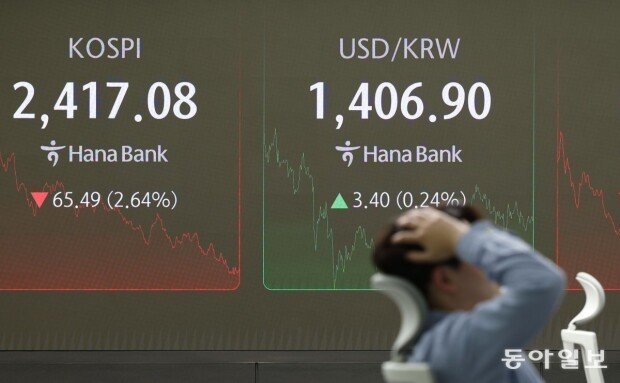‘Trump storm' hits South Korea's economy
‘Trump storm' hits South Korea's economy
Posted November. 14, 2024 07:50,
Updated November. 14, 2024 07:50

Concerns over U.S. President-elect Donald Trump’s second term are creating a perfect storm for the South Korean economy. Watchers expect a strongly pro-U.S. stance by Trump's second term will hit South Korea's export-dependent economy even harder, sending a huge shockwave through the country's financial markets. The job market situation has also deteriorated significantly amid sluggish domestic demand, including the self-employed sector. There are even signs of a return of the triple-dip (high exchange rate, high interest rate, and high inflation) crisis, as the high exchange rate is pushing up import prices and delaying interest rate cuts.
On Wednesday, the benchmark KOSPI closed at 2,417.08, down 2.64 percent from the previous day. It has plunged more than 1 percent for three consecutive days since Monday, falling below this year’s record low of 2,435.90 on January 17. Investors have been fleeing the local market amid pessimistic forecasts that Trump's re-election will hurt both domestic demand and exports for the Korean economy. Foreigners sold more than 700 billion won (about 499 million U.S. dollars) on the KOSPI alone, fueling the decline.
In the last three days, the net selling amount has reached 1.5 trillion won (1.07 billion dollars). Samsung Electronics, the most valuable company on the KOSPI, plunged more than 4 percent on the day, as it is feared to fall below the 50,000 won (35.7 dollars) per share mark. The tech-heavy Kosdaq also plunged 2.94 percent to close at 689.65. The closing price was the lowest in a year and 10 months since January last year. The dollar also continued to gain ground. On the foreign exchange market, the won-dollar exchange rate jumped to 1,410.6 won momentarily in the morning. By the end of daytime trading at 3:30 p.m., it was trading at 1,406.6 won, up 3.1 won from the previous day.
With the South Korean economy in a state of general distress, there have been calls for the government to ease financial market anxiety and stabilize investor sentiment. “The government needs to take swift measures to ease anxiety, and companies need to actively prepare for the changed economic environment,” said Lee Hyo-seop, a research fellow at the Capital Market Research Institute.
이동훈 기자 dhlee@donga.com







